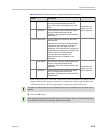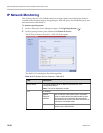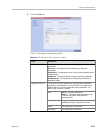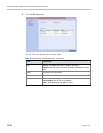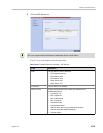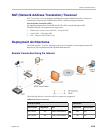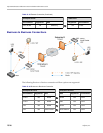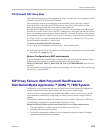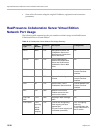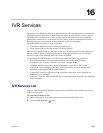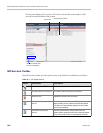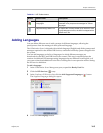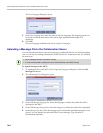
Chapter 15-IP Network Services
Polycom, Inc. 15-27
FW (Firewall) NAT Keep Alive
The Collaboration Server can be configured to send a FW NAT keep alive message at specific
Intervals for the RTP, UDP and BFCP channels.
This is necessary because port mappings in the firewall are kept open only if there is
network traffic in both directions. The firewall will only allow UDP packets into the
network through ports that have been used to send packets out.
By default the Collaboration Server sends a FW NAT Keep Alive message every 30 seconds.
As there is no traffic on the Content and FECC channels as a call begins, the firewall will not
allow any incoming packets from the Content and FECC channels in until the Collaboration
Server sends out the first of the FW NAT Keep Alive messages 30 seconds after the call starts.
If Content or FECC are required within the first 30 seconds of a call the FW NAT Keep Alive
Interval should be modified to a lower value.
To enable and modify FW NAT Keep Alive:
FW NAT Keep Alive is enabled in the New Profile - Advanced dialog box.
>> Select the FW NAT Keep Alive check box and if required, modify the Interval field within
the range of 1 - 86400 seconds.
System Configuration in SBC environments
In an environment that includes SAM (a Polycom SBC), to ensure that a RealPresence Mobile
endpoint can send content to a conference the value of the system flag
NUM_OF_INITIATE_HELLO_MESSAGE_IN_CALL_ESTABLISHMENT must be set to
at least 3.
For more details on modifying the values of system flags, see "Manually Adding and Deleting
System Flags” on page 20-12.
SIP Proxy Failover With Polycom® RealPresence
Distributed Media Application™ (DMA™) 7000 System
Collaboration Server systems that are part of a RealPresence DMA system environment can
benefit from the RealPresence DMA system’s SIP Proxy Failover functionality.
SIP Proxy Failover is supported in the RealPresence DMA system’s Local Clustering mode
with redundancy achieved by configuring two DMA servers to share a single virtual IP
address.
The virtual IP address is used by the Collaboration Server as the IP address of its SIP Proxy.
No additional configuration is needed on the Collaboration Server.
Should a SIP Proxy failure occur in one of the RealPresence DMA system servers:
• The other RealPresence DMA system server takes over as SIP Proxy.
• Ongoing calls may be disconnected.
• Previously ongoing calls will have to be re-connected using the original IP address,
registration and connection parameters.



